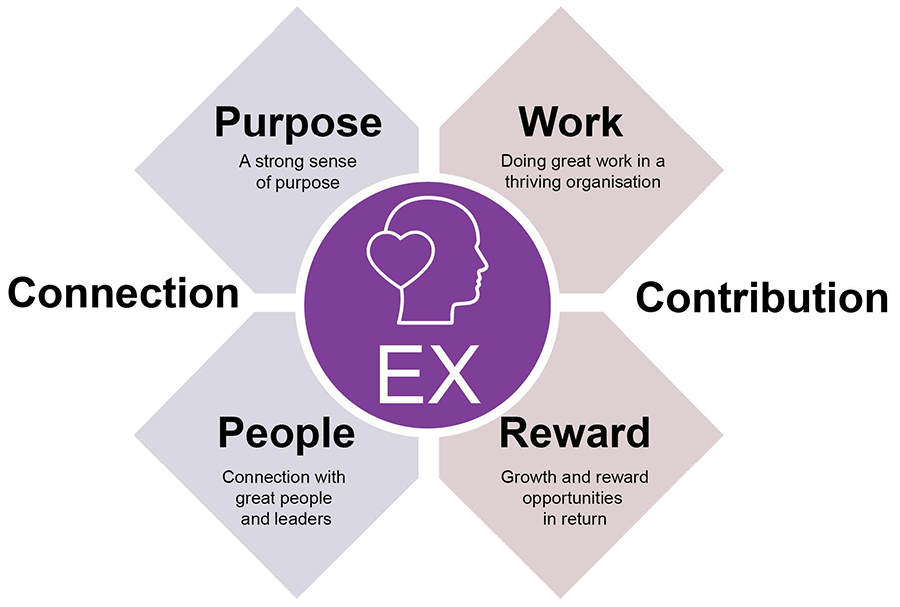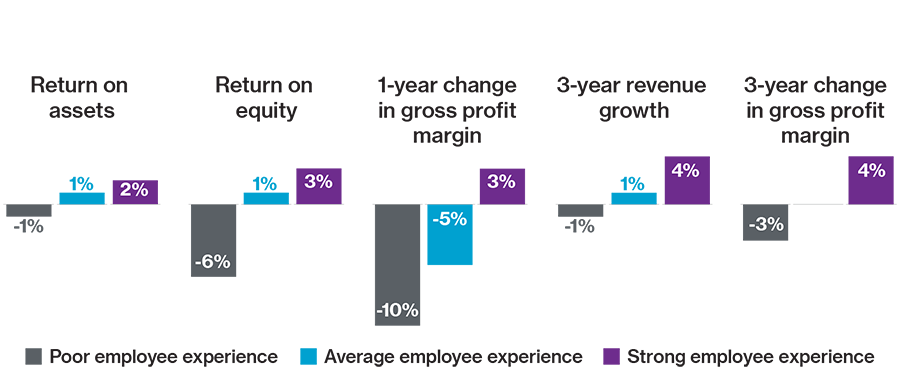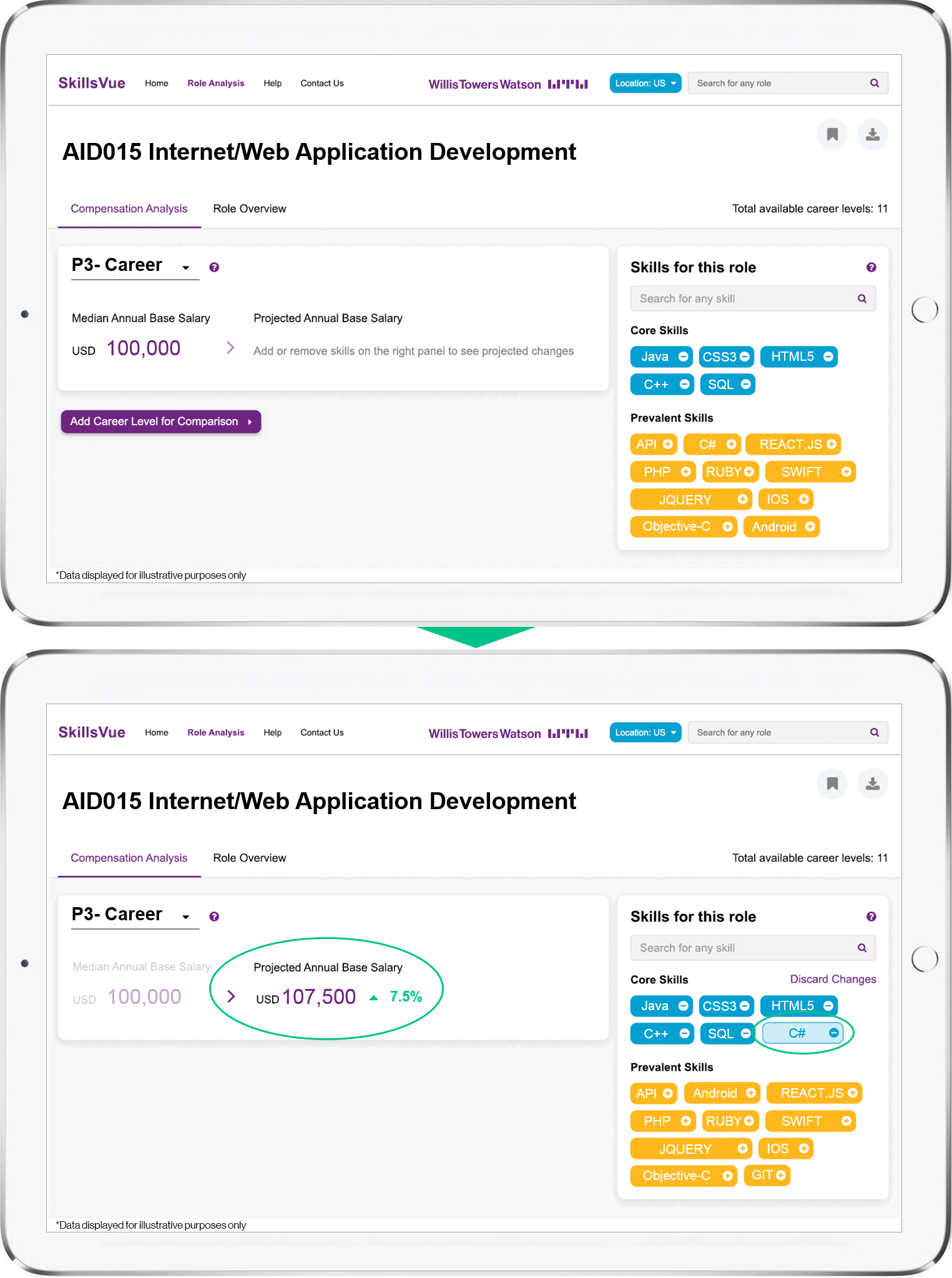Creating a winning employee experience – Part 2
At Willis Towers Watson, we send employee surveys to nearly 10 million employees a year, across more than 500 companies. Earlier this year, we carried out some breakthrough research with this data. We selected companies that had high levels of engagement (what we call Global High Performing companies or GHPs), as well as strong financial performance (reflected through the S&P and Dow Jones indices). We went on to analyse which dimensions differentiated them from the average and found that the top differentiating factors were (unsurprisingly) around inspiration, drive, trust, growth and market focus.
We translated these drivers into four pillars that form the foundational model for employee experience (EX): purpose, work, total rewards and people (Figure 1). Based on this model, we developed an index to predict financial performance – and we spent nine months tracking 120 companies on this index (Figure 2).


Source: Willis Towers Watson Normative Database
The results were startling and stark: Not only could we predict the organisation’s financial performance based on their EX index scores, we could predict whether they outperform, or underperform, their sector. That’s quite powerful, as it goes beyond an intuitive or anecdotal perspective of how the employee experience drives organisation performance. Indeed, these pillars are fundamental to get right to drive a high performing employee experience (and financial performance)!
Primary among these pillars is the increased sense of purpose that talent is now looking for. Indeed, it is a sign of the evolution of work (and we daresay humankind), that more and more routine work is getting automated. This trend is not new – the invention of the assembly line and mechanised farming are but a few examples of how early automation shaped civilisation. The explosion of digitisation and machine learning are a continuation of this trend, albeit to an order of magnitude several times higher.
This is increasingly leading to work being deconstructed into constituent tasks, routine tasks being automated, and higher value tasks being reconfigured into new jobs. From the perspective of talent, this is great news – as we are seeing an increasing need to find meaning in the work we do. Organisations need to tap into this sense of purpose to contribute to a higher ideal; and structure work to be more meaningful for talent. Also, organisations need to attract and retain talent that is aligned with the organisation’s purpose.
Organisations need to tap into this sense of purpose to contribute to a higher ideal; and structure work to be more meaningful for talent.
A related second foundational pillar is the work itself. With the increase in technology usage and task automation, we run the risk of de-humanising talent by seeing them as a means to an end (i.e., getting a task completed). Also, deconstruction and disaggregating of jobs may be accompanied by use of a broader talent ecosystem to deliver the work. We currently see this in the form of freelancers and contingent workers engaged for project-based work. The risk of this often remotely connected talent pool feeling disconnected and disengaged from the organisation’s larger purpose is high. There is a need to be deliberate in designing these assignments so that people feel they are doing great work for a thriving organisation, even if it is for a short stint.
It’s only fair to talk about total rewards when we talk about work. The discussion about greater transparency and equity in pay is one of most positive shifts in the total rewards landscape.
We are seeing an increasing number of organisations use segmentation and ‘personas’ to develop differentiated benefit offerings.
Disclosure norms are enabling these practices to evolve and become the standard rather than the exception. The need for fairness is interestingly balanced by the need for differentiated policies and individualised pay structures. We are seeing an increasing number of organisations use segmentation and ‘personas’ (borrowed and adapted from marketing) to develop differentiated benefit offerings. Another area that is fast evolving is the willingness to pay for specialised skills (see Spotlight).
As specific skills take on a premium in the new world of work, it becomes critical for employers to be able to understand how to compensate them, particularly in real-time as they are liable to be quite fluid.
To help employers make these decisions, Willis Towers Watson has launched SkillsVue, which matches job postings and compensation data to determine premiums that our clients can expect to pay for specific skills. This reflection of value and the real movement of skills in the marketplace enhances the employee experience of skilled workers.
Built on a foundation using compensation data from Willis Towers Watson’s Artificial Intelligence and Digital Talent Compensation Survey, SkillsVue uses proprietary machine learning algorithms to analyse real-time skills data and calculate the granular valuations of skills and their impact on pay.

Our exclusive technology addresses all aspects of collecting, extracting, classifying, mapping and analysing skill data in relationship with our existing compensation data and represents the most complete vision to date for skill-based compensation.
Skill-based pay modelling at a glance:
01
Participant job descriptions are collected for each job submitted to the Artificial Intelligence and Digital Talent Survey.
02
Skills are extracted from job descriptions via a Natural Language Processing algorithm and added to Willis Towers Watson survey data for the relevant jobs.
03
Skill-augmented survey data are analysed across companies to predict pay for individual skill permutations.
04
Skill interface allows users to select a job and customise skill selection.
05
Predicted pay is displayed on the stored data model.
Finally, despite so much technology, data and analytics capability being available (or maybe because of it), the people element of human resources has probably never been as essential as it is today. Increasing disruptions across almost all industries are driving sometimes harsh resizing decisions. This, coupled with ageing populations, means that organisations need to be deliberate about making their talent feel valued and cared for. In addition, with increasing proportions of contingent workers, integrating and engaging this broader talent pool is critical to ensure that they contribute their best to the organisation.
It is heartening to see HR progressing at a heightened pace to ensure that talent thrives and organisations evolve into socially responsible enterprises.
With the employee experience becoming central to people processes of organisations, it’s not surprising to see specialised roles in HR focusing on designing and delivering the talent journey. It is in fact heartening to see that HR is progressing at a heightened pace to ensure that talent thrives and organisations evolve into socially responsible enterprises.
Harnessing the potential of these pillars – by being purpose-driven, redefining the nature of work, focusing on skills and rewards, and creating strong connection among employees – will allow organisations to truly create a winning employee experience.
To find out more on how to create a winning employee experience, please contact:
| Title | File Type | File Size |
|---|---|---|
| Creating a winning employee experience – Part 2: Redefining purpose, work, and rewards to retain talent | 1.3 MB |